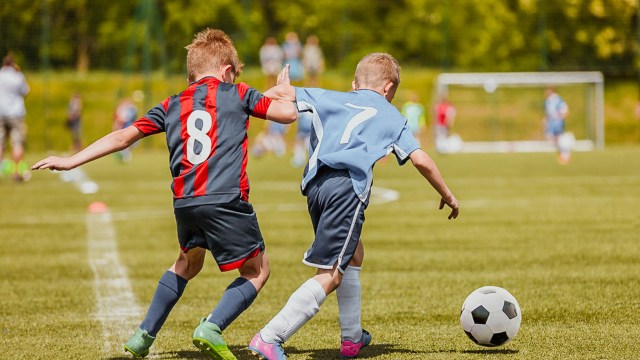Youth sports are no joke. You’ve got a kid who loves to run, jump, shoot, catch, and dribble at all hours so you sign them up for a rec league with games on a Saturday morning. The next thing you know, they’re on a travel team with multiple weekly practices and a tournament every weekend for most of the year. Your kid is a standout on the team, and they’re improving every day. Does it mean they’re headed to the pros? Should you be pushing them harder or training them more often? The answer might surprise you. Nate Daniels, a former pro athlete and sports performance coach, took to TikTok to offer important reminders for parents of kids in youth sports—including those whose kids aren’t the ones dominating.
@natedaniels_1 I’m asked by sports parents multiple times a week about their athletes potential let’s talk about it. #youthsports #youthathletes #sportsparents #athlete #athletesoftiktok #sports #athletes #sportstiktok #sportsperformance #parentsoftiktok #athletemotivation #athletemindset @Next Level Athletes
♬ original sound – Nate Daniels
Related: The Only 2 Things to Say to Your Kid After a Game
1. Your 4-to-13-year-old kid is probably not an elite athlete.
The first thing Daniels discusses is the term “elite athlete.” He explains that an elite athlete sticks out like a sore thumb. People will notice this kid. They’ll talk about them to other parents and the coaches. And while your child might exhibit incredible talent at a young age, only 2% of the nearly 500,000 kids that play at a college level wind up in a professional league, according to an NCAA fact sheet. The point he’s trying to make stick with sports parents and youth athletes is when a child is young, it’s too early to tell.
“I’m not as enamored with child prodigies. You’ll see people posting their seven-year-old on the internet, juggling the soccer ball or doing whatever, and you’ll see in the comments, ‘Next stop, MLB, next stop, NBA, next stop, NFL.’ All I can think of when I see that is slow down,” he says.
As a professional who knows about athletic performance, Daniels stresses that no one knows a kid’s potential until they hit puberty. “I’ve coached and trained youth athletes that were completely dominant at the youth level and after they hit puberty disappeared. And the beautiful thing is, I’ve also coached the opposite: kids that struggle at the youth level hit puberty and become dominant.”
Related: Why Are So Many Kids Quitting Sports By Age 11?
So, parents, if your nine-year-old is blowing by everyone on the soccer pitch, take a deep breath, wait, and see. Daniels stresses the importance of allowing young athletes to enjoy their success. And that while urging them to work hard is fine, planning their MLB career before they hit their growth spurt isn’t the best course of action. “I’m not saying this to burst your bubble or temper your pride. I want you to be proud of your kids, but these expectations you’re projecting just aren’t realistic most of the time,” he says.
2. If your kid is struggling, remind them to keep at it—their athletic potential isn’t determined at this age.
Daniels’ second reminder isn’t just for the parents, it’s for the athletes who might be having a tough time at the youth level. “Keep your head down and keep working. Don’t let anything discourage you; you never know what the future holds. To fulfill that potential, keep putting in the work. Athletic development is a marathon, not a sprint.” He adds that no one cares who the best U8 or U9 player is. It’s when you’re closer to 17, 18, and 19 years old that you can get a better measure.
He encourages kids to learn the game and to have as much fun as possible doing it, which might be the most important advice offered. Playing sports and learning to work as a team has so many more benefits for children than hoping they go pro one day does. It teaches them about hard work, cooperating with others, gross motor skills, a healthy lifestyle, and ultimately, enjoying childhood while learning skills that’ll take them through the rest of their lives.
